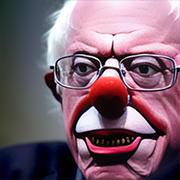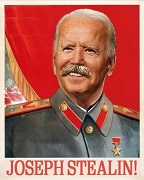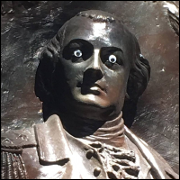|
Corek posted:How did it come about that Butler's VP candidate is a Confederate veteran who raised a regiment to fight against the north and still today does not consider blacks equal to whites? Strange bedfellows. (The last Greenback VP candidate, Barzillai Chambers, was also a Confederate veteran.) The Greenbacks were divided into two factions: the Westerner-Southerner Faction and the Easterner Faction. The Westerner-Southerners were largely composed of poor white farmers, trapped by insurmountable debt but believers in personal independence. They blamed government intervention for their economic burden and saw "Greenbacks" as a way to rectify the situation and return to the status quo. Party leaders believed in a kind of Jeffersonian ideal and were deeply suspicious of authority figures. Towards the end of the movement, the faction proposed making corruption a capital punishment. The Easterners were largely composed of poor urban workers, impoverished by tiny wages and huge retail prices. They had no such objections about government overreach. The Eastern part of the party focused much more on cooperation and compromise, pushing the party to cooperate with the Democrats and Republicans to achieve their goals. While the Western-Southern wing of the party proved to be much more influential, the Easterners tended to be much more palatable to the general public. They also tended to be the ones behind the non-fiat money related party planks. Gradually, the two factions drifted apart and the party became increasingly dysfunctional. The Easterners were eventually absorbed by the two major parties and the Westerners and Southerners eventually defected to the Populist Party.
|
|
|
|

|
| # ? May 10, 2024 13:03 |
|
Franco Potente posted:The Democrats selected Alabama senator John Sparkman as VP in 1952. And FDR's first VP was hardline Texas conservative John Nance Garner. Oh goddamit even when I was leafting through wikipedia I knew I hosed up.
|
|
|
|
Corek posted:Oh goddamit even when I was leafting through wikipedia I knew I hosed up. You're right about a southerner being nominated for the presidency, though. The Democrats couldn't make a southern politician palatable to the whole country, and so the nomination would often go to an acceptable northern figure ; running mates from the South would be used to appease Solid South voters (Arkansas Senator Joseph Robinson in 1928 and Tennessee Senator Estes Kefauver in 1956 are two more that come to mind). As a campaign strategy, I think it revealed the weaknesses in the factional divides of the Democrats more than it projected unity, however.
|
|
|
|
Franco Potente posted:Arkansas Senator Joseph Robinson in 1928 quote:His response to a guard who questioned his credentials at the 1920 Democratic National Convention was a punch in the face. I guess they were afraid not to run with him after that
|
|
|
|
not an inspiring election went greenback, i guess there's a reason cleveland won this one though
|
|
|
|
Franco Potente posted:You're right about a southerner being nominated for the presidency, though. The Democrats couldn't make a southern politician palatable to the whole country, and so the nomination would often go to an acceptable northern figure ; running mates from the South would be used to appease Solid South voters (Arkansas Senator Joseph Robinson in 1928 and Tennessee Senator Estes Kefauver in 1956 are two more that come to mind). As a campaign strategy, I think it revealed the weaknesses in the factional divides of the Democrats more than it projected unity, however. I think it is interesting that even when a southerner did become president again with Woodrow Wilson, his political career had been effectively launched in the north (New Jersey).
|
|
|
|
 I'm convinced.
|
|
|
|
I guess I must have searched for Presidential candidates only and grafted "VP" on that in my memory.
|
|
|
|
Lord of Pie posted:I guess they were afraid not to run with him after that poo poo, I know who I'm writing in this November.
|
|
|
|
Thump! posted:poo poo, I know who I'm writing in this November. He got his face on money while still alive through a reputation for vigorous facepunching
|
|
|
|
Spotted at Union Station. Which one of you is still campaigning for the Anti-Masonic Party?
QuoProQuid has issued a correction as of 01:01 on May 29, 2016 |
|
|
|
QuoProQuid posted:Spotted at Union Station. Which one of you is still campaigning for the Anti-Masonic Party? Maybe they just hate architects.
|
|
|
|
Ibogaine posted:"Ma, ma, where's my pa!" GONE TO THE WHITE HOUSE, HA! HA! HA!
|
|
|
|
Nckdictator posted:
Boss Tw*ed.
|
|
|
|
Prohibition it is. This is a terrible election.
|
|
|
|
metalloid posted:Prohibition it is. This is a terrible election. SA decides, every election is the worst election.
|
|
|
|
Thank you for voting. Having overcome staunch opposition from the South (and particularly the State of Louisiana), Benjamin Franklin Butler has been elected President. His Imperial Majesty, Lord-President of these United States and Protector of their Liberties promises to rule justly and fairly in the years to come. His Mightiness only requests that no one question his status as the first among men, Imperator of the American nation. The Vice-President-elect Absolom M. West has already arrived in Washington to see how he might make America great again. Surely, once the railroads are defeated and the blacks are put in their place, America will return to what it was envisioned as: a utopia for landed white men. To celebrate their conquest, Butler and West have ordered the construction of a grand statue from France, which they call the Statue of Victory. The statue is expected to be finished by 1886 and will be displayed in the New York Harbor, as a warning to immigrants arriving from abroad.  MOST POPULAR TICKET: Benjamin Franklin Butler / Absolom M. West (Greenback/ Anti-Monopoly) - 40 votes (55.6%) John St. John / William Daniel (Prohibition) - 24 votes (33.3%) Grover Cleveland / Thomas A. Hendricks (Democratic) - 5 votes (6.9%) James G. Blaine / John A. Logan (Republican) - 3 votes (4.2%) TOTAL: 72 votes QuoProQuid has issued a correction as of 15:35 on Jun 4, 2016 |
|
|
|
ELECTION OF 1888 Click here to vote in the Election of 1888! Click here to vote in the Election of 1888!  ELECTION WILL CLOSE SUNDAY, 12 JUNE 2016  Background: The Election of 1884 did not go well for the Republican Party. Blaine’s barely concealed corruption caused defections from high-ranking Republicans and alienated core constituencies of the party. Though Grover Cleveland had his own failings, the Republicans were unable to capitalize on them and the party lost the presidency for the first time in twenty-four years. Grover Cleveland had a decidedly different outlook on politics than his predecessors. Instead of viewing the presidency as a venue for promoting policy, Cleveland thought the president should serve as a non-partisan figure, a guardian to reign in the Congress when they overstepped their authority. Unsurprisingly, Cleveland soon broke records with his use of the presidential veto. He disliked using legislative solutions to address social and economic problems and prevented Congress from passing various reforms. There was, however, one issue that Cleveland soon found himself able to champion: free trade. In his State of the Union Address in 1887, Cleveland called upon Congress to dramatically reduce American tariffs and allow foreign goods free access in the country. While the tariffs themselves had little impact on American industry, as the United States could produce most goods cheaper than competitors, the proposal divided the country along familiar lines. The Democrats, as they had in 1816, demanded a removal of all restrictions on trade. The Republicans, echoing their Whig predecessors, firmly opposed the issue and cited a need to improve American industry. As the campaign turned towards policy issues, the two parties took steps to prevent the campaign from devolving into personal attacks, as it had in 1884. The Republicans nominated Benjamin Harrison, a respectable public figure who had little interest in exploring Cleveland’s personal history. The Democrats, meanwhile, renominated Cleveland. Reflecting his hands-off approach to politics, Cleveland has deferred almost all responsibility to his ailing running mate, Allen G. Thurman. Thurman’s old age and his physical ailments, which include cholera, head cold, and neuralgia, has caused him to collapse repeatedly on the campaign trail. As a result, the press has focused its attention more on Thurman’s health than the contents of his speeches. Many Republicans have come to derisively refer to the Democratic campaign as “lethargic” and have criticized Cleveland for his apparent unwillingness to help his campaign, either publicly or behind the scenes. Harrison, by contrast, has given almost 100 speeches on his front porch. Harrison’s activism in the campaign represents a sharp break in political tradition and has left many wondering whether active campaigning will be the new norm for presidential candidates. Further complicating matters for the Democrats is the Murchison Letter. Hoping to expose the Democrats as corrupt, Republican activist George Osgoodby conducted a sting operation against British Ambassador to the United States, Lionel Sackville-West. Posing as a former Englishman who had moved to California, Osgoodby asked the Ambassador how he should vote in the upcoming election. The Ambassador responded back that Cleveland was the best man from the British perspective. When the letter was publicly released two weeks before the election, it set off a national firestorm. Irish voters have threatened to vote against Cleveland en masse. REPUBLICAN PARTY NOMINEES:  Presidential Nominee: Benjamin Harrison
 Vice-Presidential Nominee: Levi P. Morton
DEMOCRATIC PARTY NOMINEES:  Presidential Nominee: Grover Cleveland
 Vice-Presidential Nominee: Allen G. Thurman
PROHIBITION PARTY NOMINEES:  Presidential Nominee: Clinton B. Fisk
 Vice-Presidential Nominee: John A. Brooks
UNION LABOR PARTY NOMINEES:  Presidential Nominee: Alson Streeter
 Vice-Presidential Nominee: Charles E. Cunningham
|
|
|
|
If it wasn't for his stance on immigration Streeter would probably win the Goon vote in a landslide.
|
|
|
|
Damnit, why do the Prohabitionists have to be the reasonable ones? America's gonna be the dryest country until Debs comes along.
|
|
|
|
Still voting for theocracy for uh the third or fourth election now.
|
|
|
|
rofl, Streeter is so gaddamn typical of the populist left. Tax the rich! Nationalize the utilities! gently caress no, don't improve things for non-whites. That's identity politics, and the wrong priority. I don't see why we shouldn't have a ban on :bernget:
|
|
|
|
IDK, for all the extremist tickets we voted for on the basis of their anti racism, I think I can give this one to Streeter for the women's rights stance alone. We should throw them a bone for once imo
|
|
|
|
MMM Whatchya Say posted:IDK, for all the extremist tickets we voted for on the basis of their anti racism, I think I can give this one to Streeter for the women's rights stance alone. We should throw them a bone for once imo I'll pick a few for him from that graveyard for non-people building railroads.
|
|
|
|
"[Fisk] thinks current immigration laws should be enforced and supports neither strengthening or laxening current immigration law." What were the current laws?
|
|
|
|
Andorra posted:"[Fisk] thinks current immigration laws should be enforced and supports neither strengthening or laxening current immigration law." chinese go home
|
|
|
|
Raskolnikov38 posted:chinese go home How do you strengthen that? Genocide?
|
|
|
|
I think it wasn't literally that, that would have been the strengthening?
|
|
|
|
I'm very excited that I was notified of this thread's existence from elsewhere on the forum. Thank you for allowing us to
|
|
|
|
Andorra posted:"[Fisk] thinks current immigration laws should be enforced and supports neither strengthening or laxening current immigration law." The Alien Enemies Act of 1798: Sets the residency requirement for naturalization to 14 years; allows the president to deport or imprison aliens who are " "dangerous to the peace and safety of the United States;" Page Act of 1875: Classified all Asian laborers as "undesirables;" Chinese Exclusion Act: Prohibited the immigration of Chinese laborers for ten years and prohibited the naturalization of Chinese subjects currently living in the United States. Codified deportation procedures for certain kinds of Chinese residents; and Alien Contract Labor Law: Prohibited persons and companies from importing contract laborers. Also note that United States v. Wong Kim Ark (1898) has not happened yet, so the status of the Chinese children born in the United States is nebulous and undefined. There's no guarantee that they would be considered citizens, as we might expect today. QuoProQuid has issued a correction as of 17:42 on Jun 4, 2016 |
|
|
|
Thump! posted:I'll pick a few for him from that graveyard for non-people building railroads.
|
|
|
|
quote:He also wants to use the new revenue to address major social issues, like guaranteeing pensions for veterans and their dependents, protecting African Americans from Southern harassment, and guaranteeing all African Americans access to federal education. Harrison is also in “favor of the use of both gold and silver as money, and condemns the policy of the Democratic Administration in its efforts to demonetize silver.” Harrison wants to counteract the growing influence of the railroads and possibly reserve large tracts of land for federal use, but has not stated how he would like to accomplish this goal... Harrison strongly opposes restrictions on immigration and was one of the few legislators to vote against the Chinese Exclusion Acts. Sounds good to me.
|
|
|
|
Voting for Harrison so that we can finally complete the work of the Revolution and vanquish the British once and for all.
|
|
|
|
What's with this fuckin' Cleveland guy? He lost miserably and now he's back. He'll go away after this time around, right?
|
|
|
|
If it wasn't for his stance on the immigration laws, I'd vote Fisk. As it stands, I'll vote for Harrison and hope he will outlast his grandfather in office.
|
|
|
|
Yeah I totally get the whole thing about the immigration but it'd also be nice to vote for women's rights for like, just one election. There is a ticket with better immigration stances though, but it's not like he had a great track record with native americans, so it's no rose garden over there either.
|
|
|
|
We've reached the "so obscure there's no Wikipedia page" stage of Prohibition Party biographies.
|
|
|
|
Benjamin Harrison is ranked as a pretty bad president, historically, but dammit, he has better positions than Prohibition, Union Labor, and obviously the Benjamin Harrison posted:I cannot always sympathize with that demand which we hear so frequently for cheap things. Things may be too cheap. They are too cheap when the man or woman who produces them upon the farm or the man or woman who produces them in the factory does not get out of them living wages with a margin for old age and for a dowry for the incidents that are to follow. I pity the man who wants a coat so cheap that the man or woman who produces the cloth or shapes it into a garment will starve in the process. Benjamin Harrison posted:God forbid that the day should ever come when, in the American mind, the thought of man as a 'consumer' shall submerge the old American thought of man as a creature of God, endowed with 'unalienable rights'. Benjamin Harrison posted:I earnestly invoke the attention of Congress to the consideration of such measures within its well-defined constitutional powers as will secure to all our people a free exercise of the right of suffrage and every other civil right under the Constitution and laws of the United States. No evil, however deplorable, can justify the assumption either on the part of the Executive or of Congress of powers not granted, but both will be highly blamable if all the powers granted are not wisely but firmly used to correct these evils. The power to take the whole direction and control of the election of members of the House of Representatives is clearly given to the General Government. A partial and qualified supervision of these elections is now provided for by law, and in my opinion this law may be so strengthened and extended as to secure on the whole better results than can be attained by a law taking all the processes of such election into Federal control. The colored man should be protected in all of his relations to the Federal Government, whether as litigant, juror, or witness in our courts, as an elector for members of Congress, or as a peaceful traveler upon our interstate railways. Platystemon has issued a correction as of 19:51 on Jun 4, 2016 |
|
|
|
As a long-time Greenback voter I'm worried by the Republicans' stance on the gold standard, but I'm leaning towards Harrison anyway. e: Gotta say, I don't care for Levi Morton though. I guess around now is when the Republicans are shifting from progressive stances to FYGM capitalism? Mountaineer has issued a correction as of 19:52 on Jun 4, 2016 |
|
|
|

|
| # ? May 10, 2024 13:03 |
|
Lycus posted:What's with this fuckin' Cleveland guy? He lost miserably and now he's back. He'll go away after this time around, right? I like how the Democrats have been reduced to a minor party whose last stay in national office was in 1833 under John Quincy Adams. Somehow, the Republicans and the Prohibitionists seem like the only parties able to consistently get votes. Meanwhile, there's a revolving door of third parties that can't last more than two election cycles. House Speaker elections must be fun. Mountaineer posted:As a long-time Greenback voter I'm worried by the Republicans' stance on the gold standard, but I'm leaning towards Harrison anyway. The business wing has been around since the beginning. It's only over the next few elections that business interests and issues like civil rights will start to diverge. QuoProQuid has issued a correction as of 20:16 on Jun 4, 2016 |
|
|





























